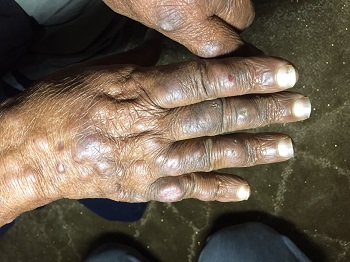 Abdullah's leprosy was diagnosed in time to save him from severe nerve damageFor years, Abdullah suffered from numbness in his extremities, but couldn’t figure out what it was. He left his small village in eastern Libya several times trying to find treatment, even going to neighboring Tunisia once—without success.
Abdullah's leprosy was diagnosed in time to save him from severe nerve damageFor years, Abdullah suffered from numbness in his extremities, but couldn’t figure out what it was. He left his small village in eastern Libya several times trying to find treatment, even going to neighboring Tunisia once—without success.
Eventually, though, the symptoms of his slow-progressing disease became unmistakable: it was leprosy.
Although leprosy has been nearly eliminated from Libya for more than three decades, 6 to 8 new cases are diagnosed every year. While historically it inspired fear in the ancient world, it is now a very treatable disease.
A WHO Libya doctor, along with a laboratory technician from Libya’s Ministry of Health, visited Abdullah in his coastal village, about 50 kilometres from the city of Al-Bayda. As part of their exam, they did a skin slit smear from his earlobe, considered the best place to test for the bacillus.
Once the diagnosis was confirmed, WHO began providing Abdullah with free medicines through Libya’s National Leprosy Programme. Sometimes he comes to Al-Bayda for the medicine; sometimes the two-person team goes to him. After a year on the medication, he—and other diagnosed leprosy patients in Libya—should be cured: they won’t have leprosy and won’t be able to spread it.
Abdullah was lucky: he got the diagnosis, and treatment, before he developed irreversible nerve damage or even blindness. “He really appreciated that we prevented the complications and provided him with the treatment,” says Dr Abdelaziz Alahlafi, National Professional Officer for WHO Libya. “He was very happy.”
To reduce the chance of family members catching the disease, WHO Libya also provides prophylactic treatment for a patient’s whole household, following official guidelines that WHO developed.
“Slowly but surely, working together, WHO and Libya’s Ministry of Health are stamping out leprosy,” says Elizabeth Hoff, WHO Representative in Libya. “By treating both the patients and by protecting their families, we hope this will be the last generation to be afflicted by this age-old disease.”



